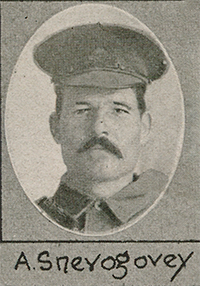Andrew Snegovoy
| Russian spelling | Андрей Никифорович Снеговой |
|---|---|
| Born | 26.10.1881 |
| Place | Odessa, Ukraine |
| Ethnic origin | Russian |
| Religion | Church of England |
| Father | Nikifor Snegovoy |
| Mother | Olga Snegovoy |
| Contacts | Andrew Snegovoy, Victor Schepenski, Sigismund Vitold Romashkevich and Michael Rowinski (Ravensby) arrived at Australia together |
| Arrived at Australia |
from Harbin on 3.04.1910 per Kumano Maru disembarked at Brisbane |
| Residence before enlistment | Queensland |
| Occupation | 1916 motor driver; 1925 labourer |
| Naturalisation | 1926 |
| Residence after the war | Brisbane, 1924-1925 Harbin, 1925 Newcastle, NSW, 1928 arrived from Japan to Sydney, 1930 Newcastle |
Service #1
| Service number | 2241 |
|---|---|
| Enlisted | 9.03.1916 |
| Place of enlistment | Brisbane |
| Unit | 49th Battalion |
| Rank | Private |
| Place | Western Front, 1916-1918 |
| Casualties | WIA 1917, 1918 |
| Final fate | RTA 12.1919 |
| Discharged | 11.10.1919 in London |
Materials
Digitised naturalisation (NAA)
Digitised service records (NAA)
Digitised Embarkation roll entry (AWM)
Court martial file (NAA)
Blog article
From Russian Anzacs in Australian History:
The October 1917 revolution and, especially, Russia's withdrawal from the war only increased the determination of some Russians to obtain their discharge, although it manifested itself in different ways: Permakoff's open protest was the most bizarre; several others simply refused to go to the front. [...] Another [...] case was that of Andrew Snegovoy from Odessa (49th Battalion), who enlisted as a motor-driver, had also been wounded twice and had returned to the trenches again; he left his battalion on 12 September 1918, was accused of desertion and sentenced to five years' penal servitude, too. Like the others, prior to deserting he had made an unsuccessful attempt to obtain a discharge, arguing that his family in Russia needed his help.
Gallery

Andrew Snegovoy
Queenslander Pictorial, supplement to The Queenslander, 22 July 1916, p. 24
 Russian Anzacs
Russian Anzacs